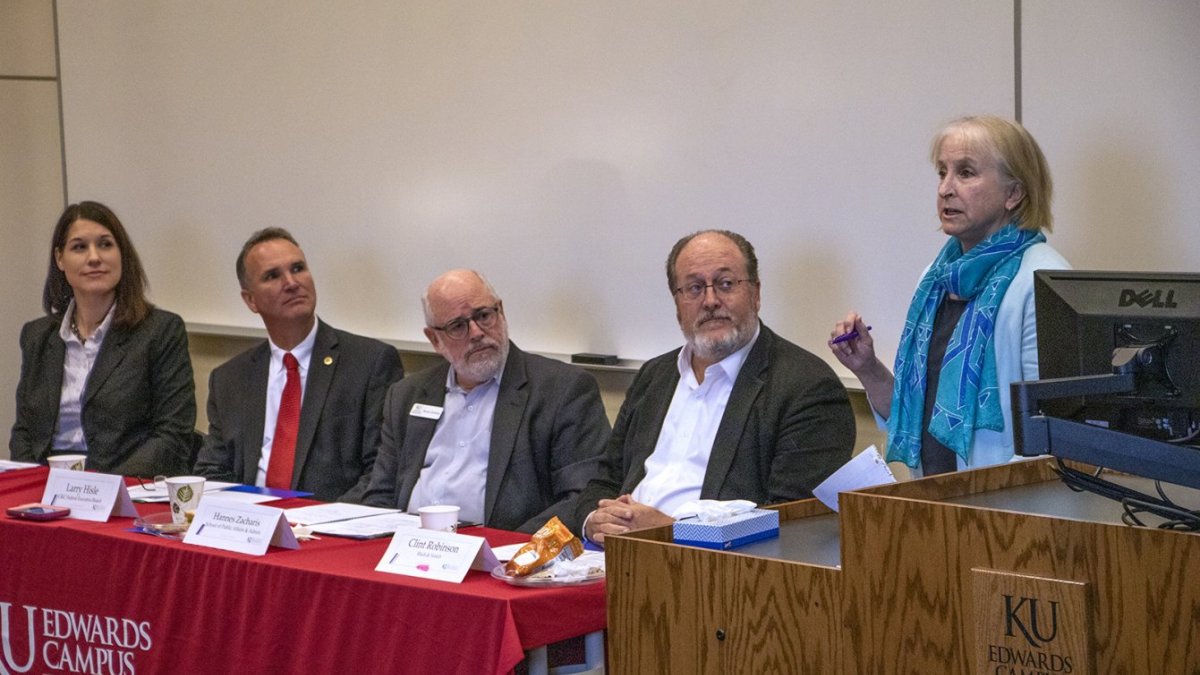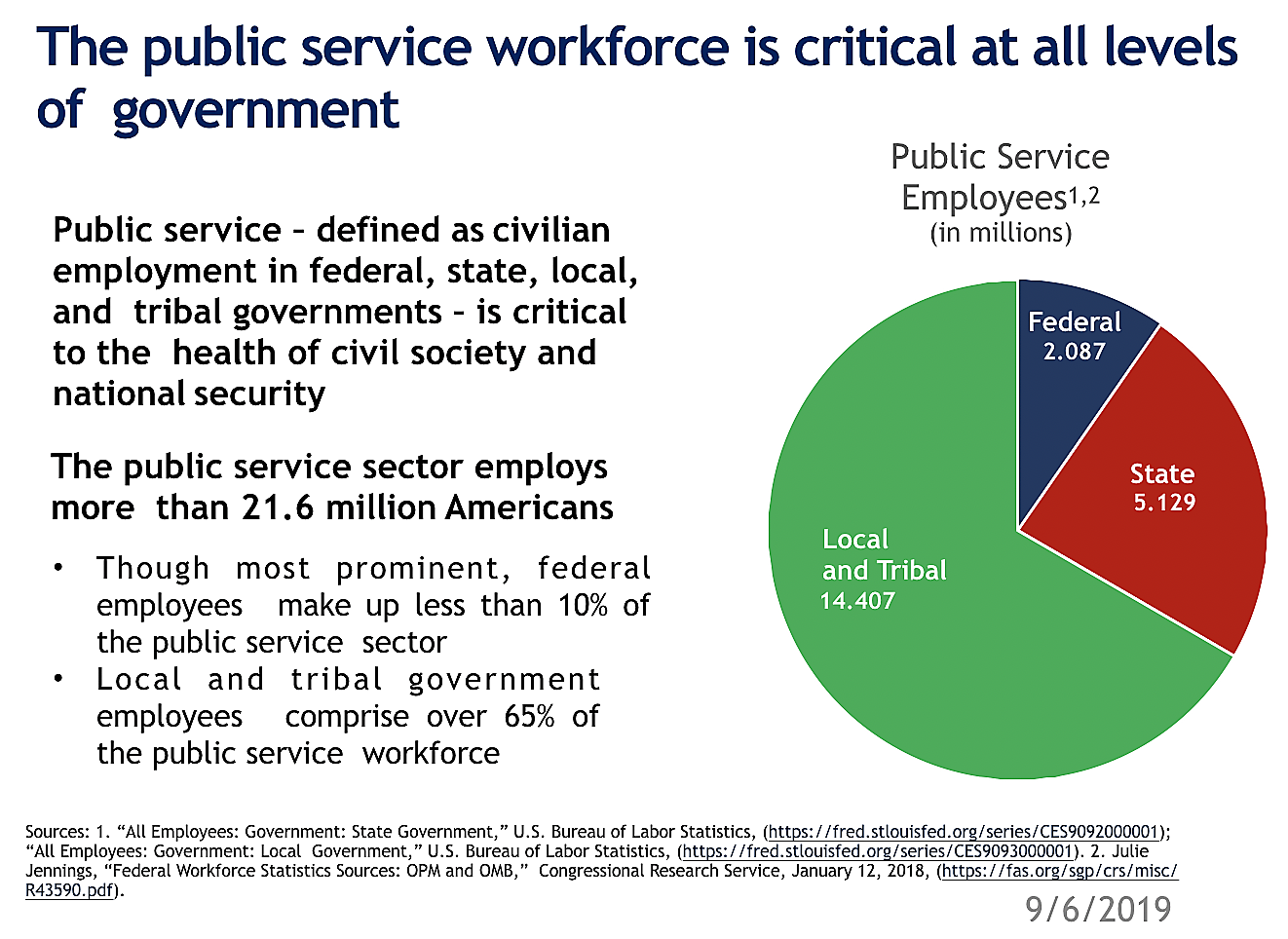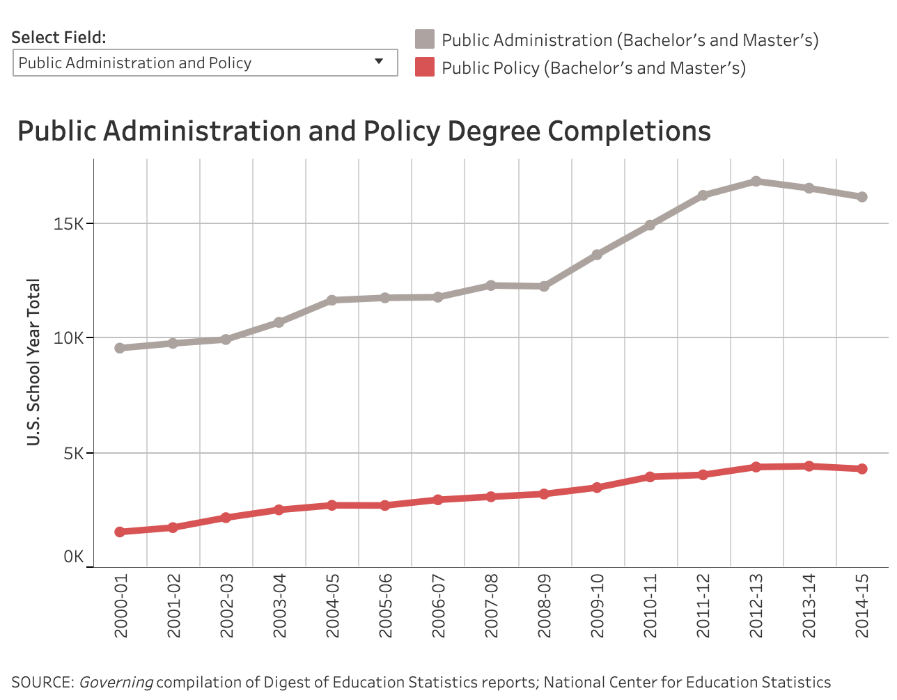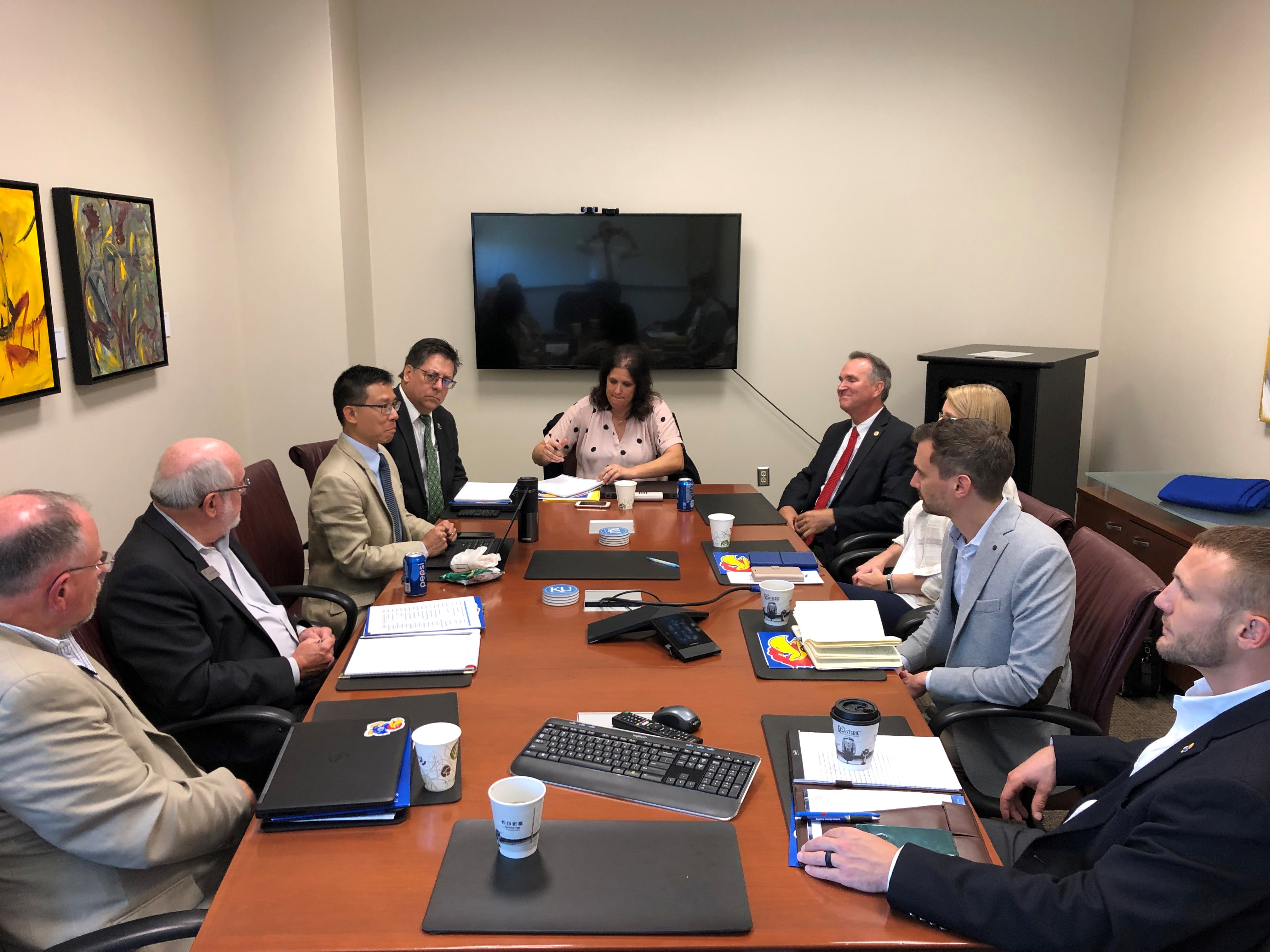Diverting Government Crisis: Government-to-University (G2U) initiative aims to bolster government workforce

KU Edwards Campus driving force in connecting Kansas City university and government leaders in effective collaboration
Schoolhouse Rock hammered the purpose of the federal government with its catchy jingle of the U.S. Constitution’s Preamble: “...establish justice, insure domestic tranquility, provide for the common defense, promote the general welfare and secure the blessings of liberty to ourselves and our posterity."
But what happens if we don’t have enough highly skilled and competent people at the helm of federal, state and local government to provide needed services? Does “domestic tranquility” turn to chaos?
The services citizens rely on such as police and fire protection, education, welfare programs, health care, aviation, highway building and maintenance, and so many more could fail to function, or at least not function effectively.
“The public sector plays a key role in everyone's daily life — from the water we drink to the air we breathe, the roads and other infrastructure we use daily, to public safety, public health, food safety,” said Alfred Ho, professor in KU’s School of Public Affairs & Administration. “We want the public sector to be efficient, effective, accountable, and ethical, and we need the best to serve in the public sector.”
Ho is the co-chair of the new Government-to-University (G2U) Regional Council steering committee created with the help of the Volcker Alliance to advance relationships between governments and universities that improve government effectiveness. KU Edwards Campus (KUEC) hosted the first partnership meeting Sept. 5, bringing Kansas City area universities and federal government leaders together to discuss ways to accomplish the G2U objectives.
“Today’s successful Kansas City G2U Coalition event between the University of Kansas Edwards Campus and the Federal Executive Board demonstrates the influence government and universities can have when partnering together to motivate young people to enter the public sector workforce,” Volcker Alliance President Tom Ross said.
The public sector is facing what many describe as a “workforce crisis,” with a combination of more workers eligible for retirement and fewer applications for open positions. The Volcker Alliance recently selected Kansas City to pilot its new G2U program, creating a regional marketplace to match government research, workforce development and hiring needs with local university capacity.
“Government without a high-quality, efficient workforce is a concern that we have in looking at the data, specifically from really good independent research,” Presidential Management Council (PMC) Fellow Dennis Branson said. “One part of that is the talent pipeline. So many statistics show we do not have people 30 and under that are working in the government.”
Branson is a career Federal Emergency Management Agency (FEMA) employee working in Kansas City. He was selected for a six-month Presidential Management Council detail to work on G2U from April to November. He has engaged with eight universities within the Kansas City region to begin to explain G2U’s vision and coalition development process using luncheon meetings, classroom encounters and developing ways for students to see government missions in action. He said engaging multi-disciplinary, cross-cutting players is critical to success.
“Our primary stakeholders have spanned from career services to undergraduate and graduate practitioners/professors,” Branson said. “The bottom line is that going out to show them (the “U”) that we (the “G”) are serious and invested is the special sauce that will support that long-term relationship, critical to any sustainability. The reception has been outstanding.”
Kansas City’s G2U Regional Council not only connects local, state and federal government leaders with key faculty and administrators from surrounding colleges and universities, it also includes nonprofit, civic, and private sector leaders. Kansas City G2U partners are working to cultivate a talent pipeline of skilled workers for public sector careers and collaborate on research initiatives. G2U partners aim to increase interest in public service careers and ensure that students have access to the training and education that public sector employers are looking for.
“We’ve organized three work groups – one to conduct a talent-to-industry exchange on the public sector, which will involve a detailed labor analysis of public sector employment; one focused on developing a data academy to help train public sector employees on using data to inform decisions; and a third on regional recruitment, which may include a centralized portal for government job openings,” said Lauren Palmer, director of local government services for the Mid-America Regional Council (MARC).
Kansas City chosen to pilot G2U
MARC, along with University of Kansas (KU) professor Rosemary O'Leary, were instrumental in bringing G2U to the Greater Kansas City area.
From a small breakout room of professors and government practitioners at Syracuse University’s Minnowbrook Conference Center to a regional coalition in Kansas City formed last March, the G2U initiative was born from concern.
Kansas City native Rosemary O’Leary hosted that conference a decade ago when she was a professor at Syracuse. She is now the Edwin O. Stene Distinguished Professor at the University of Kansas School of Public Affairs and Administration.
“Rosemary is a nationally recognized leader in our field, and through her connections with the Volcker Alliance and U.S. Office of Management and Budget, we were able to bring G2U to Kansas City,” Ho said.
O’Leary said that day they took turns talking about what they thought were the most compelling issues in public administration from a practitioner and academic perspective.
“When it was my turn, I said, ‘I want to blow up the field,’” O’Leary told the G2U planning group gathered at KUEC. “Because we are an applied field, our goal is to work in tandem with practitioners to help improve government and to help solve society’s most pressing public problems and we’re not there yet. So, how can we blow up the field to make things better? Do we need to start over, infuse a little energy and change in the field to make society better?”
O’Leary’s thoughts of finding ways for universities to work more closely and regularly with government resonated with Volcker Alliance President Tom Ross and Deputy Assistant Director of the US Office of Budget and Management, Dustin Brown who was, at the time, beginning a “sabbatical” with the Volcker Alliance.
Paul Volcker, who founded the Volcker Alliance in 2013, was motivated by “the vision of a public sector workforce with experience, preparation and commitment to ensure government at all levels deliver with excellence.” At age 92, he still believes in the urgency around the need to test new strategies for recruiting top talent into the public workforce and to engage with universities who can provide a pipeline of young talent as well as the research needed to bring knowledge from the university to the public sector. With that in mind, Ross and Brown explored ideas of how to bring universities together with government in a sustainable way. They conducted design sessions at four sites around the country last fall that led to the launch of G2U.
When she found out Kansas City was one of the ten cities in the country being considered as a pilot location for the first Regional G2U Council, O’Leary went on the offensive, spreading the good news about her hometown to anyone involved who would listen.
“People think we’re kind of a cowtown, or they just don’t know,” O’Leary said. “I talked about the Edwards Campus and its importance and especially the work of [Assistant Vice Chancellor of Undergraduate Programs] Shannon Portillo in linking with community colleges. I talked about UMKC and other universities in this area. They had heard of some of our strengths, but they didn’t know that we [KU] have the No. 1 program in city management in the United States, and they did not know about MARC.”
A month later, O’Leary received the news Kansas City had made the top four selected sites. She then reached out to MARC Executive Director David Warm to see if he was interested in playing a larger role in the initiative. Warm quickly agreed and MARC hosted visits from the Volcker Alliance with participants from universities and all levels of government in the Kansas City area.
“The Volcker Alliance was impressed with the level of participation, interest and enthusiasm at the convening they held here last fall,” Ho said. “They felt like MARC had the organizational capacity to help drive this work, with well-established relationships with governments and universities already in place.”
Volcker representatives also believed the bi-state nature of the region and the highly regarded federal government presence led by the Greater Kansas City Federal Executive Board (FEB) would make it easier to involve all three levels of government – local, federal and state. The Volcker Alliance ultimately selected Kansas City as one of its initial G2U sites with MARC as a lead partner.
“The 119 cities and nine counties that make up the bi-state Kansas City metro area are ripe for a collaborative public service workforce agenda. We’re looking forward to partnering with the Volcker Alliance to launch a G2U Regional Council that will connect our region’s great universities with public agencies and deliver the effective results our citizens expect and deserve,” said Warm, when the selection was made.
O’Leary confirmed that Volcker Alliance representatives were impressed with Kansas City.
“When I debriefed with the Volcker Alliance afterward, they said that Kansas City had all the elements for a successful G2U and was one of the two initial sites they hoped to get up and running,” O’Leary said. “I was thrilled! I think we, everyone who was there, did Kansas City proud. They now know us as a location of excellence based on our collaborative strength as a whole.”
The government workforce crisis

In the last decade, the realization that young, educated professionals are not choosing careers in any field or at any level of government — local, state or federal — has brought concern.
The data showing government employment as a share of the civilian labor force exhibits this downward trend, especially in local and state employment which are currently on a slide that has not been seen since the late 1970s.
More alarming to some is the fact that the percent of the workforce eligible to retire from federal, state and local government is predicted to double in the next five years, according to data compiled by G2U. And while 23 percent of the private sector workforce is under the age of 30, only 7 percent of the federal government workforce is.
In a study by the National Commission on Military, National and Public Service, three challenges arose to recruiting young people: awareness, access and aspiration.

Government entities need to strengthen hiring efforts (PDF). Outdated, slow hiring practices, ineffective candidate assessments and a significant skills gap between skills needed and the job requirements combine to exacerbate the overall disinterest young professionals show in landing a government job, according to the study. In January of 2018, the Commission launched a two-year effort to encourage and inspire more Americans — particularly young people — to serve their communities and country and strengthen American democracy.
Even of those students who graduate from a National Association of Schools of Public Affairs and Administration (NASPAA) university, only 2 percent accept federal government positions, according to data presented at the meeting.
From a university standpoint, the U.S. Department of Education data shows that several of the top government-related academic fields — including criminal justice, political science and public administration — have seen the number of degrees awarded level off or dip slightly over the past few years.
In mid-August, the Federal Executive Board (FEB), in collaboration with KUEC professor Ho, launched an initial survey of federal practitioners to dig deeper into the current government hiring practices and the relationship between government entities and local universities in the Kansas City area. The G2U Steering Committee members are still tabulating the results of that survey but they used parts of it to help begin discussions at the meeting about what next actionable steps the regional G2U council could take to advance its national three-point initiative.
G2U’s three-point initiative
Kansas City’s G2U Regional Council, led by its assembled steering committee, is building those actionable steps around its three-point initiative established by the Volcker Alliance from findings in the exploratory phase.
- To build a vital talent pipeline into the public sector workforce;
- To ensure that the workforce has the skills to meet public sector challenges; and
- To provide answers to the government’s top priority research questions.
Those steps require cooperation and collaboration from area universities such as KUEC, government agencies at all levels, and the private and nonprofit sectors. KU already has a formal partnership with the FEB which includes a discount for federal government employees on selected academic and Professional & Continuing Education courses. In Kansas City, the Regional G2U Council has developed three work groups that tie back to the initiatives.
1. Public Sector Talent-to-Industry Exchange (TIE) Work Group
Members of this group are working to transfer proven private-sector talent pipeline strategies into the public sector context and implement an action plan to recruit top talent where there is the greatest need. Beginning with industries deemed most important to the regional economy, TIEs have been completed with KC Global Design (engineering and architecture), Skilled Trades and life sciences — enabling a variety of coordinated efforts to skill up the regional workforce. KUEC already provides a variety of skills training for in-demand careers boot camps in coding, data analytics and cybersecurity.
2. Data Academy Work Group
In partnership with the Centers for Civic Impact (“Civic Impact”) at Johns Hopkins University and regional higher education partners, the G2U Coalition is working to upskill 250 federal practitioners in the Kansas City region in data management, open data, performance management, advanced analytics, and community engagement. G2U will develop a training academy for public sector employees to develop the tools and skills needed to use data to inform decisions. The program will be delivered through MARC’s Government Training Institute. Partnerships with KU and other higher education institutions will be leveraged to develop curriculum, recruit professors and offer certification(s) for academy participants.
3. Regional Recruitment Work Group
This group aims to increase the awareness and access of public sector careers among job seekers. One strategy is to launch a centralized job portal, aggregating government job postings at all levels for the region.
For KUEC, the mission of G2U encompasses many of the initiatives already in play for the university, which gathers data from Kansas City area employers to create academic and professional development programs that meet the needs of the region.
Beginning the conversation at KU Edwards Campus
With the long-standing ties between KUEC, the distinguished professors in the School of Public Affairs & Administration, and KUEC’s long-time commitment to providing the Kansas City region with a highly-qualified workforce, hosting the first official meeting of the G2U Regional Council was a natural fit for KUEC. About 40 leaders from the federal government, universities and the private sector met to discuss current initiatives, data and further opportunities.
“The Federal Executive Board and KU are key partners that have been involved with G2U from the beginning,” Palmer said. “We hope to strengthen these partnerships to advance G2U priorities … and dig in to the work that needs to be done.”

Presidential Management Council (PMC) Fellow Dennis Branson said KUEC helps advance the G2U goals through its academic offering and central Kansas City metro service area.
“Continued engagement and support by practitioners like we’re seeing here with career services, multidisciplinary folks and senior leadership, that's why KU Edwards has been very helpful,” Branson said. “The audience that we're getting here at KU Edwards is important and they provide a lot of experiential learning and continuing education courses.”
Cook welcomed the group to the meeting and then introduced O’Leary who gave the background of G2U and how the Volcker Alliance chose Kansas City. Ho presented the initial data from the survey and then O’Leary moderated a panel discussion of the results. Invited to speak on the panel were Palmer, Larry Hisle, Director of the FEB, Clint Robinson, Associate Vice President at Black & Veatch Corporation, and Hannes Zacharias, assistant professor of the practice for the School of Public Affairs and Administration.
“This was a great way for us to start the relationship building between federal employees and university folks to kind of understand where the roadblocks are for university students getting jobs in the public sector,” Zacharias said. “It was a great way to add fuel to the conversation and find pathways we can work on further.”
Zacharias has already begun to connect his students to government careers by bringing in Branson to speak to his classes about his job with FEMA.
“We talk more specifically about job opportunities and the reasons why they do that kind of work,” Zacharias said. “We are really trying to emphasize the idea that if you want to exercise your passion for doing public good, one of the best ways you can do that is being in the government.”
Follow-up meetings are already scheduled between the government and university leaders attending the meetings. For example, Kimberly Stille, the regional administrator for Occupational Safety and Health Administration (OSHA) is in talks with Assistant Program Director of KU Edwards Campus’s Professional Science Masters Terri Woodburn to discuss the development of capstone projects for students.
“I'm very excited about the prospect of partnering with universities, schools and community agencies,” Stille said. “I think there is so much that we can gain from one another with respect to not only recruitment and retention but also career development. There is so much about the federal government that industry may or may not know and vice versa. I will be reaching out to Terry [Woodburn] because I have so many projects that we can be working on, it’s just a matter of refining them. I am very excited about the opportunities that are being presented and I’m very excited about the partners that I've already gained.”
Zacharias said the next step is to continue communicating.
“This is not the end of the conversation it’s the beginning of the conversation,” he said. “So, next steps are when is the next meeting, how do we go ahead and expand the conversations to many different disciplines, not just public administration? Every occupation you could think about in the world also has a mirror of that occupation in the government. So how do we get the word out to all these professionals that if you want to go and do your profession but also have a public service bent, look at government? In addition, we need to prepare those individuals who are going into public administration specifically to say that nonprofit is great but the government is where you can go and pursue your passion.”
The G2U work in Kansas City is just beginning and received its first major infusion in September when the U.S. General Services Administration and the Office of Management and Budget announced a $300,000 award for “innovative solutions to government challenges.” The winning proposal, titled “Data and Evidence for Government and Academic Impact” is a collaboration between the Johns Hopkins University Centers for Civic Impact, the Volcker Alliance, and MARC, focused on improving the use of evidence and data by the public sector workforce by leveraging the G2U Council in Kansas City. The project aims to help 250 federal practitioners in Kansas City by customizing an existing training curriculum and developing recommendations on how to replicate and scale it in other regions.
That type of scalable process is what G2U members in Kansas City are working toward.
“[Our goal is to formulate] a repeatable, sustainable methodology that will not only be kept going here in Kansas City but taken out all across the country in a grassroots effort,” Branson said. “If we develop a good playbook and a good way of doing this, that will be the ultimate success.”
Volcker Alliance President Thomas W. Ross is expecting nothing less.
“We look forward to the KC G2U Coalition harnessing the momentum that came out of the event to continue building similar events with other universities in the region,” Ross said.
Top Photo: Kansas City area business, government and higher education leaders formed a panel to discuss strategies that address the critical need for highly qualified and skilled government employees as part of a Government-to-University (G2U) partnership meeting held Sept. 5 at KU Edwards Campus. The guest discussion panel included (left-right): Lauren Palmer with the Mid-America Regional Council, Larry Hisle with the Kansas City Federal Executive Board, Hannes Zacharias with KU's School of Public Affairs & Administration (KUSPAA), and Clint Robinson with Black & Veatch Corporation, with moderator Rosemary O’Leary, also with KUSPAA.
The G2U Kansas City Regional Council is open to multiple academic disciplines, all layers of government, and anyone with an interest in the G2U mission. Join a Kansas City G2U work group or find out more information by contacting Alfred Ho or Lauren Palmer.
Learn more about KUEC’s bachelor’s, master’s and certificate programs in public administration.





